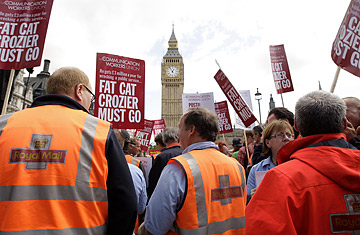
British postal workers gather outside the Houses of Parliament in central London on July 17, 2009, during a 24-hour strike over jobs, pay and services across the U.K.
After autos, airlines, banking and real estate, could the recession be changing the business of striking? From electricians in Dublin to Athens' air-traffic controllers, there's been a lot of talk of workers' walking off the job across Europe this summer. Yet the number of days lost to industrial action has actually dropped in 2009. Experts say the economic downturn is acting as a deterrent to action — and changing the way workers who do strike go about it.
There are still plenty of European workers prepared to vent, of course. Bloomberg estimates that public-sector strikes this summer by everyone from postal carriers to subway drivers could cost the British economy more than $600 million; transport workers in Bulgaria and Greece, angry because of cuts in public spending, crippled railway systems and air transportation earlier in the year, while millions of workers in France and Italy have turned out for general antigovernment strikes.
But as in the past, the recession is acting as a brake on industrial action. A report by the European Industrial Relations Observatory, to be released in September, shows industrial action at a low level last year, during the start of the recession, following something of a minor surge in 2007. In the U.K., the Office for National Statistics says there were just 756,000 working days lost to strikes last year, way down from the million or so days lost in 2007. As of May, the figure stood at just 32,000 days for 2009. Even assuming an upsurge in the summer, that's a long way from the kind of industrial mayhem Britain saw in 1979, when almost 30 million days were lost to strike action. It's a simple case of reasoning, experts say. "When workers feel confident in their job security is when they are more likely to strike," says Gregor Gall, a professor of industrial relations at the University of Hertfordshire.
It's notable that those who strike tend to be public-sector workers who are more insulated from the recession. In Britain, for example, 94% of all strikes in 2008 were by public-sector workers.
So what does a modern European strike look like? When workers go out, they tend to make it short. Royal Mail and London Underground staffs have each held one- or two-day strikes spread over a series of weeks recently. "It's partly to minimize the risk of alienating the public," says Sarah Veale of Britain's Trade Unions Council, "but it's partly to make sure they have the finance in the coffers to pay the striking workers."
In the meantime, tactics have grown more spectacular. This year French workers at Préciturn, a small engineering company, kidnapped the firm's bankers, eventually releasing them after receiving a check to keep the company afloat. Last week at a car-parts factory in Chatellerault, 180 miles southwest of Paris, workers threatened to blow up their building in protest of the level of redundancy payments. After negotiations, the workers backed down, but they have refused to rule out a return to explosives if talks founder again.
It helps, too, to play on excessive executive pay, government bailouts or other political points that might never have been mentioned in past protests. In January, eight French trade unions were able to mobilize millions of workers, pensioners and citizens in protest of the country's handling of the economic crisis. In April, the General Confederation of Italian Workers reported that 2.7 million marched on Rome under the slogan "Yes to the future, no to the past." And in the U.K. earlier this year, "wildcat," or nonunion, strikes sprung up at Total's Lindsay Oil Refinery in North Lincolnshire after jobs were given to less expensive foreign workers even though unemployment in the area had risen almost 50% in the preceding year. The strength and spontaneity of the strikes surprised many. "The recession has made the reactions of the workers much worse, as they can't work anywhere else," says Veale.
But bosses can get creative too. Workers at a British factory belonging to Vestas, a Danish wind-turbine manufacturer, have occupied the company's premises since July 20 to protest plans to shutter the factory amid falling orders. After they complained this week that they were running out of food, Vestas managers sent in a delivery of pizzas. Inside: letters telling them they'd all been fired.
